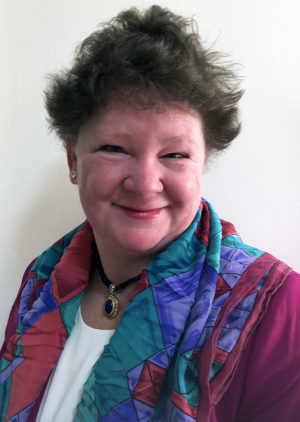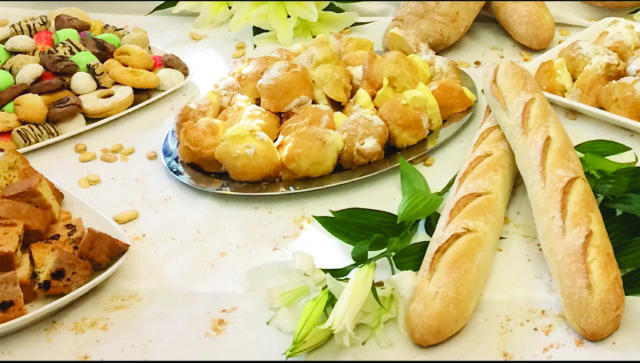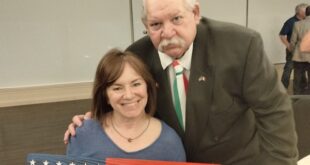 A first-time filmmaker, she took her passion for an Italian-American tradition to the finals of a prestigious national cinema competition.
A first-time filmmaker, she took her passion for an Italian-American tradition to the finals of a prestigious national cinema competition.
There are many who feel they have a film inside of them, but few who have the vision and gumption to make that dream a video reality. And for those who get at least that far, the results often bear an amateurish, awkward stamp. Given those obstacles, Kirsten Keppel’s emergence as a documentary filmmaker is, indeed, the stuff of movie legend.
Keppel turned her fascination with ancestry into artistry in her 2017 documentary “Ringraziamenti: The Saint Joseph’s Day Table Tradition.” At that point, she’d only been in film for roughly eight years, and had not attempted such a project before. But her pluck paid off: In October, Keppel’s film was named one of three finalists for the Russo Brothers Italian American Film Forum, presented by the Italian Sons and Daughters of America and the National Italian American Foundation.
Keppel didn’t win top honors for her 18:30 minute film, but she captured a $7,500 grant for her work. She shares with Lou&A the inspiration for her efforts, which stem from her lineage as a descendant of Molisani great-grandparents.
Lou&A: Tell us about your Italian ancestry and upbringing.
Kirsten Keppel: My Italian side of the family gave me a sense of unshakeable belonging to something greater than myself, and traditions that held a way to celebrate life even in difficult times. Repeating rituals — whether prayers, recipes, or untying ribbons around tulle sacks of confetti — taught me the value of doing something many times over. As an artist, that helped me understand the value of doing several drafts or takes of a work. As a child, I kept silent when people exclaimed that my name hardly suggested Italian roots; my father is of Irish and German descent. As an artist, I now look for what is hidden beneath the surface and then listen as deeply as I can for the story that wants to be told.
Lou&A: When did you know you had the bug for filmmaking and videography?
KK: In 2009, my mother gave me an ancestor album tracing back five generations on the Italian and Irish sides of her family. I took a trip to her hometown, and drove by the Italian church where four generations of family had worshipped. When I saw a “For Sale” sign on the church lawn, I stopped the car — and my heart almost stopped, too. That was literally a sign of how easily stories belonging to a once-vibrant chapter of history could fade away. I pictured myself driving through the area 15 years in the future, chattering to younger cousins and godchildren about a vanished world. Right there, I said out loud, “I need to learn how to make movies to share stories with the younger generations.”
Lou&A: What happened from there?
KK: Once home, I enrolled in an intro to documentary class. The April 2009 earthquake in L’Aquila strengthened my resolve to get involved in preserving stories. I joined the Abruzzo and Molise Heritage Society of Washington, D.C., and became its videographer.
Lou&A: How did the idea for the St. Joseph’s Day film come about?
KK: Zeppole di San Giuseppe — the ricotta-filled cream puff pastries made for the Feast of Saint Joseph on March 19 — are my earliest memory of Italian roots. My elders made zeppole every year. My father loved the pastries, and the family loved him. So I saw zeppole as both a culinary diplomat and celebratory treat. I was taught to thank St. Joseph for my home. The tradition encourages giving to others from gratitude for what we have, and to do so in a way that creates beauty and connects community. The St. Joseph’s Day tradition offers an intimate glimpse into the Italian-American heart and soul. I think it’s important to cultivate home as a haven of gratitude, beauty and nourishment.
Lou&A: Was this your first attempt at a documentary, or have there been others? If so, would you consider this your greatest undertaking yet?
KK: This is my first documentary of this scope. Before that, I collaborated with two classmates on a project at Docs in Progress in Silver Spring, Md. Our five-minute video, “The Play Lady,” is on YouTube. I also made two short videos for the Abruzzo and Molise Heritage Society’s 10th and 15th anniversaries. All this previous work helped. Still, the learning curve for Ringraziamenti was quite steep. [Laughs.]
Lou&A: How did making the film inform you as both an artist and a person of Italian lineage?
KK: As an artist, I learned that making a film is an ongoing dance of leading with the story question, while following and staying open to what wants to be told. The story will unfold during the process. I thought I’d be doing a close-up on a cream puff. I found the actual story lay in the question, “Is this tradition dying out?” The answer was, “Not according to a family in its 99th year of celebrating the tradition, a parish that revived the tradition, and a bakery that gets calls throughout the year asking for zeppole.” I also was amazed at how all roads led me to Sicily. I had not known that Sicilian emigrants brought the tradition to America, where it is much celebrated in many communities.
Lou&A: What was the most challenging part of making your film? How long did it take? Was there a particular moment in making the film that proved a particular joy or rush of exhilaration?
KK: Structuring the whole process in four months meant researching, obtaining all necessary insurances, permits, permissions and releases; then, actually filming and doing retakes, and searching for an editor. This required every spare minute outside of my full-time job. I lived on the Saturday MARC train from D.C. to Baltimore. After that, the greatest challenge was realizing I had to limit the scope of the story to one family and one community. I felt a rush of exhilaration when I met Antonio Villaronga, the film’s editor and musician, because I felt I could entrust the project to an artist who understood the story’s emotional heart.
Lou&A: Where do you see yourself going from here as a filmmaker?
KK: I have started to research what I call “hidden stories” of Italian-American contributions in Vermont. I received my M.A. from Goddard College and my B.A. from Middlebury College, both in Vermont. Making a future documentary about an aspect of Italian America in the state that gave me education for life would be meaningful. I see myself behind my camera, speaking with film crew and participants in English and Italian, making movies that elicit answers to questions I seek to address: What can we learn of living in a celebratory way, and how we can build resilience even after loss?
Lou&A: At the end of the day, why filmmaking and documentary? There are so many art forms: What here amounts to a calling and passion?
KK: Documentary lets us learn about real life from real-life experiences. Documentary makes meaning today of yesterday’s memories and memorable moments. I think documentary serves as a “moving-picture memoir.” A film is both a “moving picture” in the literal sense — and an emotionally moving story.
View Kirsten Keppel’s film “Ringraziamenti: The Saint Joseph’s Day Table Tradition” at vimeo.com/231190592.
The above appeared in the March issue of the print version of Fra Noi. Our gorgeous, monthly magazine contains a veritable feast of news and views, profiles and features, entertainment and culture. To subscribe, click here.
 Fra Noi Embrace Your Inner Italian
Fra Noi Embrace Your Inner Italian






